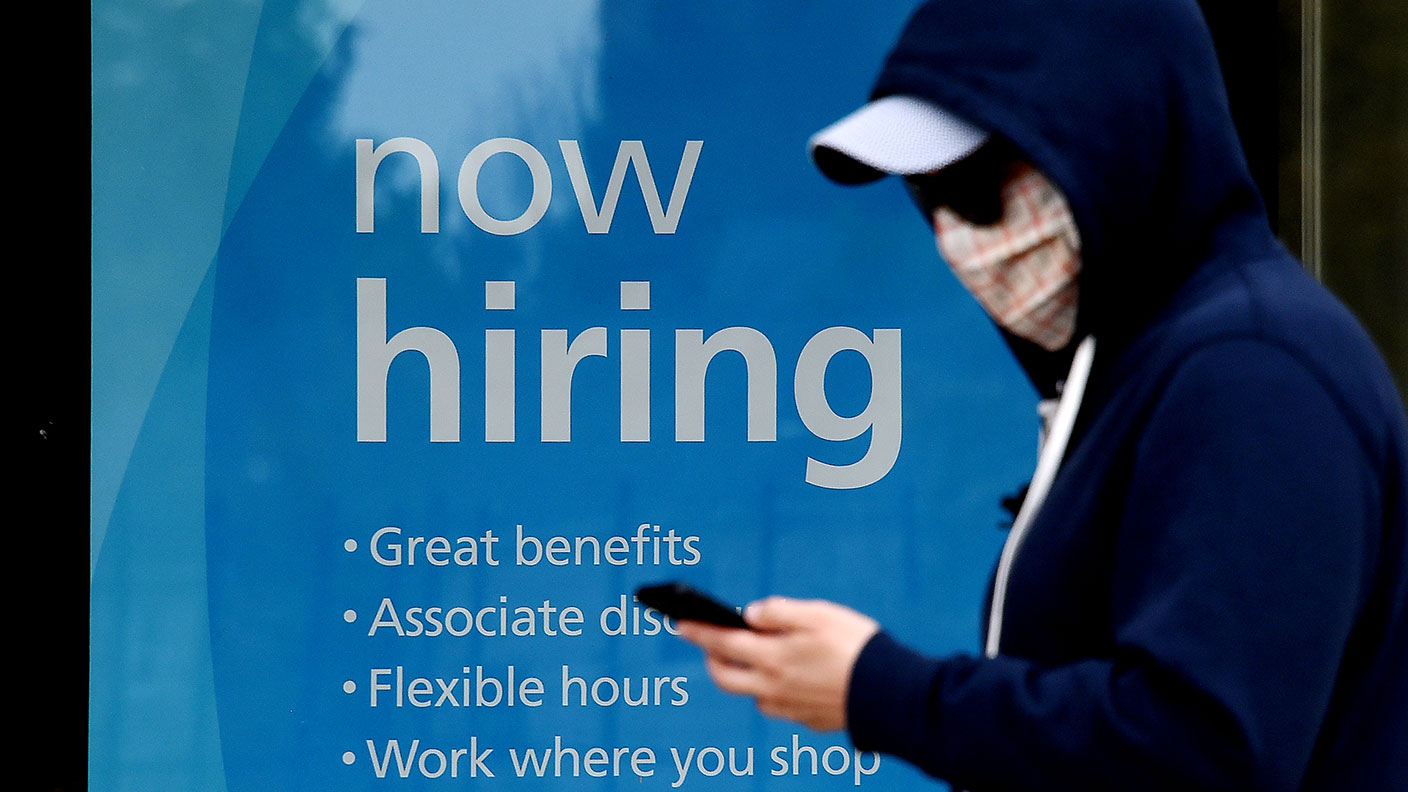Corporate debt is at record levels – here’s what the risks are
With interest rates at rock bottom, companies have been loading up on debt. And a lot of it is poor quality debt. John Stepek explains what that means for the markets, and for you.

Get the latest financial news, insights and expert analysis from our award-winning MoneyWeek team, to help you understand what really matters when it comes to your finances.
You are now subscribed
Your newsletter sign-up was successful
Want to add more newsletters?

Twice daily
MoneyWeek
Get the latest financial news, insights and expert analysis from our award-winning MoneyWeek team, to help you understand what really matters when it comes to your finances.

Four times a week
Look After My Bills
Sign up to our free money-saving newsletter, filled with the latest news and expert advice to help you find the best tips and deals for managing your bills. Start saving today!

Quick reminder: I'm hosting a webinar with currency specialists OFX this afternoon. If you have any questions about exchange rates and the general election, particularly if you have overseas transactions or business to consider, then do tune in you can sign up here.
Debt. We're swimming in it.
According to Enda Curran on Bloomberg, the world is now carrying a record $250trn in debt, if you include all individual, government and corporate debt. That's about 300% of global GDP.
MoneyWeek
Subscribe to MoneyWeek today and get your first six magazine issues absolutely FREE

Sign up to Money Morning
Don't miss the latest investment and personal finances news, market analysis, plus money-saving tips with our free twice-daily newsletter
Don't miss the latest investment and personal finances news, market analysis, plus money-saving tips with our free twice-daily newsletter
That's a lot. But it's one specific component of that debt which is worrying away at the back of many minds in the market right now.
Corporate debt.
Companies have been using debt to fund all the wrong things
According to David J Lynch in The Washington Post, as of the end of June, companies in the US owed nearly $10trn, in the form of corporate bonds. That's almost 50% of US GDP, which is a record.
And this is not just a US thing. So far this year, reports Finbarr Flynn on Bloomberg, companies have sold $2.4trn in debt (across currencies). That's also a record.
Let's be clear: this is entirely unsurprising.
Companies can fund themselves in one of two ways: they can borrow money and pay it back with interest (debt funding), or they can sell chunks of themselves, giving shareholders the right to a share of future profits (equity funding).
Right now, debt funding is a lot cheaper than equity funding, and it's readily available. So it makes sense to fund your company by borrowing money rather than selling equity. As Gibson Smith of Smith Capital tells Lynch, "companies have done the rational thing. If you tell them they can borrow cheap and borrow long, they will take advantage."
However, what companies have done with the borrowed money is not really what central banks wanted them to do when they cut interest rates and made it easier to borrow.
The idea was that companies would take advantage of low rates to invest in expanding their businesses. But this is a bit like the argument that governments should take advantage of low rates to invest in "shovel-ready" projects. It's fine in theory, but in practice, someone has to be ready with the shovel.
In reality it's quite difficult to create "shovel-ready" projects when it's not clear where the demand is coming from. "If you build it, they will come" might work as a business model in films, but it's trickier to pull off in the real world (I give you exhibit A: WeWork).
So what have companies been doing with the money? A variety of things. They've been spending it on acquisitions these destroy value more often than not, but they make chief executives feel briefly like masters of the universe. Investment bankers love them; they are an easy way to juice your numbers on a temporary basis; and they are a lot less work than actually building a better business that can grow organically.
They've also spent a lot of money on share buybacks. Buybacks are not always bad. Lots of clever people on Twitter defend them as being no different to dividends (or superior, once you include tax treatment depending on country); but clever people tend to miss the human element, and there are many more malincentives built into the buyback structure than into the dividend one.
Buybacks can be used to game executive pay plans, for a start. Also, having to find the dividend payout every year reminds managers of who they're working for. Buybacks give managers too much discretion on that front.
The trigger point for a corporate debt crisis
Anyway. You can see why companies have taken on so much debt. The question is: should we be worried? After all, borrowing costs are really low. That's why there's so much debt. And for all that we've been worrying about it, interest rates have stayed low too. So it's affordable, right?
Well, the problem isn't just the quantity of the debt. It's the quality, too. A record amount of debt is sitting on the BBB credit rating that separates "investment grade" from "junk". Also, record amounts of debt have been issued with far less stringent protections for lenders attached.
What does that mean?
Corporate bond funds are often only allowed to hold investment grade debt. If we get an economic deterioration, to the point where the credit ratings agencies start downgrading corporate debt en masse, then markets may be hit by a positive army of "fallen angels" companies who lose their investment grade status.
Of course, if we end up in such an environment, there won't be any buyers for high-risk "junk" debt either. So you'd have a load of forced sellers selling into a market with very few buyers. In turn, that means a lot of companies who were borderline in the first place would face much higher interest rates when it comes to refinancing their debt.
It's not an exact parallel, but imagine you were coming to the end of a five-year fixed-rate interest-only deal on your mortgage. You now need to refinance (or "roll over") the debt, but interest rates have tripled in the meantime. It's not so much a question of "are you in financial trouble?" as "is this an existential crisis or just a crisis?" (The Washington Post piece is worth a read for more grisly details).
Three points for you to bear in mind
We can't know when this timebomb might go off. We saw a scare on this front back in 2015. Back then, it was mostly confined to the shale industry, and a rebound in the oil price combined with ongoing low interest rates managed to delay the day of reckoning.
But in practice, what it means is that when the next recession comes we'll probably see more companies go bust. And the amount of money that can be salvaged from the carcasses of said companies, will be lower than ever before.
What does all this mean for your money?
First, don't panic. This won't happen overnight. We'll get warning signs. Yields on corporate debt will go up (markets tend to be ahead of credit rating agencies on these things). The spread (the gap) between the yield on dodgy company debt and that on a US Treasury will widen significantly. So we'll keep an eye out for that.
Second, remember that bondholders stand in front of equity investors in the queue for the lifeboats. Every time a company takes on more debt, the shareholders are taking more risk, whether they are aware of it or not. So be aware of how much debt the companies you own already have.
Third, own a bit of gold. The central bank answer to any debt-fuelled crisis in the past, has so far boiled down to money printing. Governments are likely to follow, either after or even before the next crisis. That's likely to be inflationary, and in any case, hints of instability in financial markets tend to be good for gold.
Get the latest financial news, insights and expert analysis from our award-winning MoneyWeek team, to help you understand what really matters when it comes to your finances.

-
 Barings Emerging Europe trust bounces back from Russia woes
Barings Emerging Europe trust bounces back from Russia woesBarings Emerging Europe trust has added the Middle East and Africa to its mandate, delivering a strong recovery, says Max King
-
 How a dovish Federal Reserve could affect you
How a dovish Federal Reserve could affect youTrump’s pick for the US Federal Reserve is not so much of a yes-man as his rival, but interest rates will still come down quickly, says Cris Sholto Heaton
-
 Is the US in recession and does it matter?
Is the US in recession and does it matter?Analysis There's a heated debate over whether the US is in recession or not. But why does it matter? John Stepek explains
-
 Has the chancellor done enough to save the UK from recession?
Has the chancellor done enough to save the UK from recession?Analysis UK Chancellor Rishi Sunak announced a new package last week to ease the cost of living crisis. John Stepek explains whether the risk of a UK recession still remains.
-
 Is the UK too open to overseas takeovers?
Is the UK too open to overseas takeovers?Analysis Data shows that the UK is more open to overseas takeovers than other major markets. John Stepek asks: should investors care?
-
 How to manage your money as inflation just keeps rising
How to manage your money as inflation just keeps risingAnalysis Uk inflation is at a 30-year high – and it won't be falling any time soon. So what can you do? John Stepek explains how to manage your money to combat rising prices.
-
 Inflation is going to stay even higher for even longer
Inflation is going to stay even higher for even longerAnalysis Commodity prices – everything from energy to food – are going through the roof. And that’s not likely to end any time soon, says John Stepek. Here's what that means for how you invest.
-
 Inflation is incredibly inconvenient, as we’re all about to learn
Inflation is incredibly inconvenient, as we’re all about to learnAnalysis Inflation doesn't just eat into your wealth, it eats into your time – and can be devastating for those on the lowest incomes. And it's not going away any time soon, says John Stepek. Here's how to invest.
-
 The cost of living crisis is global – US inflation just hit another 40-year high
The cost of living crisis is global – US inflation just hit another 40-year highAnalysis With US inflation running at 7.5%, it’s clear that the cost of living crisis is not confined to the UK. John Stepek looks at the likely reaction from governments and central banks, and what it means for you.
-
 The strong US jobs report is good news for the economy, but not so much for markets
The strong US jobs report is good news for the economy, but not so much for marketsAnalysis January's US jobs report came in much stronger than anyone was expecting, with 467,000 new jobs added to the economy. But things might not be quite as rosy as they seem, says John Stepek. Here's why.